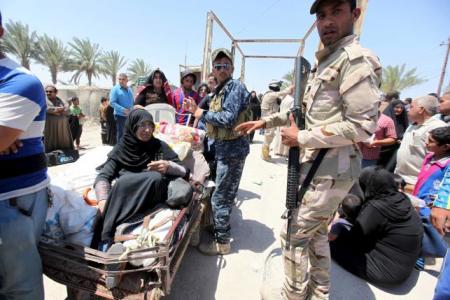John McCain Calls Fall of Ramadi 'One of the Most Disgraceful Episodes in American History;' Blasts Obama for Pulling Troops From Iraq

Sen. John McCain, R-Arizona, has called the capture of the key Iraqi city of Ramadi by terror group ISIS "one of the most disgraceful episodes in American history," and slammed President Barack Obama's decisions to withdraw American troops from the country in 2011.
ISIS took control of Ramadi after government and tribal forces retreated from their positions on Sunday, and has reportedly been carrying out mass atrocities in the city – including going door-to-door searching for sympathizers of the government and killing their families.
McCain, who is chairman of the Senate Armed Services Committee, told Fox News that the fall of Ramadi, as well as Obama's strategy when it comes to war against ISIS in Iraq and Syria, has constituted "one of the most disgraceful episodes in American history."
"This is a failure of a policy, which I think is not enough of anything," he added, arguing that there should be more U.S. military personnel in the region.
The vast majority of U.S. troops were withdrawn from Iraq in 2011 following the last campaign against terror. Obama has refused to send ground troops in the region to fight ISIS, instead focusing on an ongoing air strikes campaign aided by a broad coalition of international allies.
McCain pointed out, however, that the 2011 withdrawal created a "vacuum," and said that Islamic militants have been able to get their hands on military equipment left behind by U.S. forces.
"We left behind I don't know how much equipment, capabilities, armaments, tanks even, Humvees," the Arizona Republican said. "So we'll have to start all over, I think, on training the Iraqi military."
The White House has admitted that the takeover of Ramadi is a "setback," though Secretary of State John Kerry said that he is "absolutely confident" that the situation will change in the days ahead.
"Large numbers of Daesh were killed in the last few days, and will be in the next days because that seems to be the only thing they understand," Kerry said on Monday.
Retired U.S. Army Col. Peter Mansoor, a CNN military analyst, said that the capture of the city, which is located only 70 miles from Baghdad, is a "huge setback to Iraqi forces and to the U.S. strategy to degrade and ultimately defeat ISIS."
Residents in Ramadi have said that jihadists are throwing bodies in the nearby Euphrates river, BBC News noted, while burned bodies are lying on the streets.
A major battle is expected in the days ahead, with news that thousands of Iranian-backed militiamen are gathering at a nearby base looking to retake the city, while ISIS fighters are heading toward them.
Muhannad Haimour, a spokesman for the provincial governor of Anbar, said that over 8,000 people managed to flee from Ramadi in the past few days.
"Ramadi has fallen," Haimour had told The Associated Press. "The city was completely taken. ... The military is fleeing."
"They come to Anbar and Iraq to die," he added about ISIS militants. "It's very difficult to stop a bulldozer that's been armored, driven by a suicide bomber, with tons of explosives. And dealing with these fighters has been extremely difficult. It's not a conventional war by any stretch of the imagination."
Mansoor added that Ramadi is a "hugely symbolic" city, and is the site of previous rebellions against terror.
"It's the birthplace of the Awakening, the tribal rebellion against al Qaeda in Iraq, the forerunner to ISIS – a tribal rebellion that did so much to defeat that group back during the surge of 2007 and 2008," he explained.





















